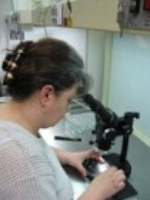Laboratory for DH Pepper Production - Detailed - Institute of Genetics and Biotechnology
Laboratory for DH Pepper Production
Laboratory for DH Pepper Production - Detailed
Last modified: 16. February 2026
Detailed presentation of the group
Due to our activity we especially do applied research.
Laboratory staff includes 1 research fellow, 2 laboratory technicians, 1 laboratory helper and 1 gardener.
Research topic
In vitro production of homozygous DH pepper lines
Research topic - Detailed
Our service is based on 30 years of professional experience. We provide homozygous doubled haploid (DH) pepper lines via in vitro anther culture for Hungarian and other breeding partners. This is a unique pepper DH service laboratory in Hungary.
Nowadays, pepper breeders are facing serious challenges due to increasingly variable appearance of different pathogens, especially of viruses. Multi-resistant hybrid production seems to be a breakthrough solution in effective plant protection. This time-consuming breeding process can be speed up highly by the above mentioned GMO-free, routinely used tissue culture method. Since homozygous individuals can be produced from a selected breeding line within one generation, time saving of this technique is really exceptional.
Tissue culture procedure starts with collection and sterilization of flower buds from the donor plants. Anthers containing microspores at the first pollen mitosis stage are isolated under sterile conditions.
During special incubation these single-celled, vacuolated microspores goes through sporophytic divisions instead of following normal gametophytic pathway. In a few days, these sporophytic divisions result in multicellular pollens and developing further into pollen embryos which structures finally produce rooted shoots. This process is called direct embryogenesis.
Normal cell divisions generally lead to practically worthless, seedless plants with haploid chromosome number (n = 12). However, if nuclear division is not followed by cell wall regeneration, the two haploid nuclei remain within one cell. As a result, fertile doubled haploid (DH) plants can be developed from these forms (2n = 2) with normal seed set. Since these spontaneous DH lines (spoDH) contain the paternal genome twice, they are genetically stable, homozygous individuals. Due to special in vitro colchicine treatment, genome duplication of young haploid anther-derived plantlets can be even achieved. In this way, induced doubled haploids (indDH) are formed which are equivalent to spontaneous doubled haploid plants both in fertility and all other properties.
In addition to our highlighted work on assisting competitiveness of Hungarian pepper hybrid production, a number of other breeding programs are also supported according to the needs of our partners.
Publications:
Evaluation of a wide range of pepper genotypes for regeneration and transformation with an Agrobacterium tumefaciens shooter strain.
Balázs, E., Á. Bukovinszki, M. Csányi, G. Csilléry, Z. Divéki, I. Nagy, J. Mitykó, K. Salánki and V. Mihálka*
South African Journal of Botany 2008, 74:4:720-725. p. doi: -
Improvement in the haploid technique routinely used for breeding sweet and spice peppers in Hungary.
Mitykó, J*., Gémes Juhász, A.
Acta Agronomica Hungarica 2006 Vol. 54(2):203-219. doi: -
Microspore-derived embryogenesis in pepper (Capsicum annuum L.): subcellular rearrangements through development.
Bárány, I., Gonzáles-Melendi, P., Fadón, B., Mitykó, J., Risueño, M. C., Testillano, P. S.*
Biol. Cell 2005, 97, 709-722. doi: 10.1042/BC20040142
Morphological events in cultures of mechanically isolated maize microspores.
Bohus Obert, László Szabó, Judit Mitykó, Anna Pretova and Beáta Barnabás*
In vitro Cell. Dev. Biol.-Plant 2005 41:775-782, November-December doi: -
The swich of the microspore developmental program in Capsicum involves HSP70 expression and leads to the production of haploid plants.
Bárány I., Testillano, P. S., Mitykó, J., Risueño, M. C.*
Int. J. Dev. Biol. 2001 Vol. 45. Supplement 1, 39-40. doi: -
Optimisation of introducing foreign genes into egg cells and zygotes of wheat (Triticum aestivum L.) via microinjection.
Pónya Z.*, P. Finy, A. Fehér, J. Mitykó, D. Dudits and B. Barnabás
Protoplasma 1999 208:163-172. doi: -
Utilization of androgenic doubled haploid (DH) lines in the improvement of an open pollinated pepper (Capsicum annuum L.) variety.
Venczel, G.*, Mitykó, J., Zatykó, J., Fári, M.
Horticultural Science 1996 28, (1-2): 14-18. doi: -
Problems and results of DH plant production in pepper (Capsicum annuum L.) via anther- and microspore culture.
Mitykó J.* and M. Fári
Proceedings of the Third International Symposium on In Vitro Culture and Horticultural Breeding (ISHS). Jerusalem, Israel 1996 June 16-21. Acta Horticulturae. 447: 281-287. doi -:
Anther Culture Response in Different Genotypes and F1 hybrids of Pepper (Capsicum annuum L.).
Mitykó J*., Andrásfalvy, A., Csilléry, G., Fári, M.
Plant Breeding 1995 114 (1), 78-80. doi: -
Agrobacterium mediated genetic transformation and plant regeneration via organogenesis and somatic embryogenesis from cotyledon leaves in eggplant (Solanum melongena L. cv. 'Kecskeméti lila').
Fári M.*, I. Nagy, M. Csányi, J, Mitykó and A. Andrásfalvy
Plant Cell Reports 1995 15:82-86. doi: 10.1007/BF01690259
Laboratory staff

|
Ágnes Mihály, laboratory technician Phone: +36-28/522-099 / 3398 Room: MATE GBI Gödöllő, Szent-Györgyi A. st. 4., ground floor, 012. E-mail: Mihaly.Agnes@uni-mate.hu |

|
Katalin Katona, laboratory technician Phone: +36-28/522-099 / 3398 |

|
László Földesi, gardener Phone: +36-28/430-494 |
| VFormer staff: |
|

